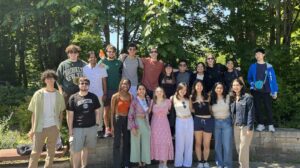Cambridge Week 6 – Conclusion: Pembroke-King’s Programme and Cambridge
Pembroke-King’s Programme
As a bit of a reiteration of my first post, this study abroad was through the Pembroke-King’s Programme, a six-week program(mme) that runs from early July into mid-August. At least for Northeastern, this runs about halfway through summer break until about a week or two before the start of the fall semester. The classes provided were an opportunity to finish all of my humanities requirements early into college (see the post about classes for more details), and while this definitely does have its benefits, it lead to a kind of mixed experience. First, I mostly picked both my classes and this program with the intention of filling these completely arbitrary requirements – and this lead to me not really picking classes based on personal interest.
The first hurdle I really experienced in terms of academics was just the sheet amount of reading that needed to be done on a daily basis. As I think I’ve mentioned before in these blogs, I really have been wanting to get back into reading, and this was not any kind of gentle reintroduction which I do appreciate. This became overwhelming at some points, definitely.
This transitions into a big point for classes at Cambridge (and more generally in the UK, as I’ve been told, but don’t hold me to that). It seems like a very ‘American thing (again speaking broadly) to test constantly – the result of this is that it takes a very short time to fall behind, and what you get from the class is probably a pretty even spread of topics across the syllabus. In contrast, the grades for the classes at Cambridge are only based on a written exam and a final dissertation. Maybe it’s just my upbringing in the former test-heavy environment, but my work ethic throughout the classes was much more a falling into habit of trying to stay ‘up-to-date on my readings. But, I think a much more helpful mindset would be to cater to the examination style. When writing the dissertations, very few of the readings actually had any direct influence on the research process. Rather, a more efficient use of time would’ve been to be familiar with all of the readings, but decide a dissertation and exam topic early on and really focus on those ideas. I think treating every subject in both classes as a possible dissertation topic ended up wasting a lot of time overall.
Since I’m about to go back to Northeastern and of course start my very STEM-heavy courseload again, reflecting on the classes I took really makes me enjoy the classes I’m taking even more. I learned more in having to write dissertations than I could’ve imagined, and I’m sure improving my writing skills from their atrophied maybe 10th-grade state can’t hurt, but I’m very glad to be going back to my comfort zone of problem sets and concrete answers in finite time.
While a lot of what I’ve written about is pretty similar to the Classes blog post, I think it’s been interesting reflecting on the program instead of just summarizing my experiences during the program.
History of the Modern Middle East
As a recount for both of these classes, I don’t think I could’ve been luckier in just taking classes just based on graduation requirements. From the outset, I loved the professor for this class. I really appreciate people who have an intense interest in extremely specific things, and this professor definitely gave off those same vibes. The course started in the 1800s (being the Modern Middle East), but had readings that extended all the way back to the beginnings of Islam. The course extended up into the Arab Spring, but throughout the lectures had moments of extending to current-day conflicts.
My favorite part of this class by far was the last seminar. The professor about halfway through just asked “any questions for me?”, and his insights on anything and everything people brought up was super interesting. I really enjoyed how much of an emphasis he put on the design of the course, and his insights into teaching in general – just talking about how arbitrary the lines are between different history classes and how they’re structured, and how a lot of scholarship done about non-Western places done for most of history is constantly reconsidered. In general, I have much more of an appreciation for history classes after taking this.
Infinite Variety Shakespearean Drama
Why did no one tell me Shakespeare was this interesting before? Not that my high school English teachers failed me or anything, but my only memories of analyzing Shakespeare in high school were churning out essays in a couple hours. Maybe it was just the focus of having an entire class dedicated to Shakespeare, but I really enjoyed everything I read. The professor again was unbelievable, the breadth of his knowledge never ceased to amaze me – if anyone analyzed even the smallest of detail, he’d not only be familiar, but be able to cite entire books or essays that analyzed that exact thing just off of the top of his head. Again, a professor that is great to talk to just because of how intensely interested he is in English literature.









